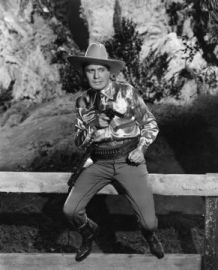bboswell wrote:I know I'm in danger of straying a little off the Jack Benny track, but I'd like to point out a few things I have observed in Amos & Andy. (Arguably the quintessential show people will point to on the subject of race.)
First of all, when growing up (I was born in 1970) no one ever pointed out to me that these characters were supposed to be African-American. The shows themselves never brought it up, and I didn't think in racial terms. I certainly am not blind to the show's history, but the latter shows simply didn't make it a point to say: "Hey! These characters are of African descent!! Notice how ... (insert any stereotype here) ... they are??" To me, they were just funny characters in funny situations.
Secondly, naysayers talk about the "lazy" stereotypes on the show. Although Andy was lazy and dim-witted and Kingfish was lazy, conniving, and not too swift himself, there are several characters who defy these "stereotypical" traits:
Most importantly Amos, the TITLE character, is intelligent, hard-working, and honest. He certainly doesn't have a glamorous job, driving a cab, but African-Americans didn't have much opportunity back then.
There were Stonewall, Gabby Gibson, and Calhoun, all lawyers; an insurance salesman (whos name escapes me at the moment;) and let's not forget Shorty who OWNED his own barbershop.
OK, I'm done with my little tyrade on Amos & Andy apologetics.
I find your comments about no one ever pointing out that the characters in A&A were supposed to be African-American. Someone of my age (born 20 years before you) or older would have no trouble identifying the characters from their accents.
I can still remember one baseball play-by-play announcer referring to an African-American player (probably in the '60s) as being articulate. Having heard the player speak in interviews, I knew what the translation was for that: "He doesn't sound black."
Of course by the time I was a young child, A&A had been on television with an all-black cast, and as I grew up, the reruns were shown almost continuously in syndication. In fact, Chicago was the last major market to pull the TV show off the air. There was a lot of mugging on that show, and of course the accents were straight out of Stepin Fetchit (especially Lightnin').
Oddly enough, several years ago, a syndicated special was made, hosted by comedian George Kirby, that was a tribute to the TV show. I think it was an attempt by Kirby and/or the producers to take some of the stigma off the show. Indeed, the humor was universal, but I just couldn't get around the stereotyping. Even with a black cast, to me it seemed that A&A was all about what white people thought was black humor.
In the long run, maybe that's the difference. You don't get much more stereotyped that Eddie Murphy as Mr. Robinson, but it's a black man satirizing white stereothypes of blacks. There's a lot of stereotyped behavior in Richard Pryor's humor, but it's a black man satirizing the stereotypes. I think a lot of how comfortable I feel about such humor has to do with who is doing the writing.
[As a side-sidebar to this discussion, the sidebar being the Amos & Andy discussion, I remember in sixth or seventh grade seeing an assembly at school that was obviously sponsored by Quaker Oats, because it was an hour of entertainment featuring "Aunt Jemima." This would have been no later than about 1962. The relevance here is that Aunt Jemima was played by Amanda Ranolph (I think that's her first name) who played Mama on the A&A TV show and who was also Louise the maid on the Danny Thomas Show. I doubt if anyone at Quaker Oats would conceive of doing that today, even if that person were certifiable!]

